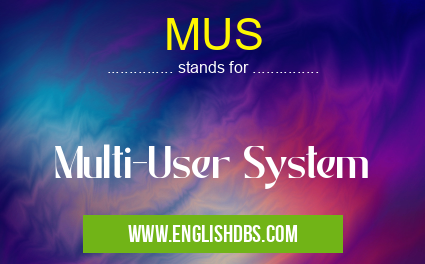What does MUS mean in ELECTRONICS
A Multi-User System or MUS is an operating system that allows multiple users to access a single computer, or a network of computers, simultaneously. It's designed to provide efficient access control, multitasking capabilities and data sharing, while also offering reliable protection of all the assets under its management. With this type of system, users have the ability to collaborate on projects, share documents and communicate in real time. This type of setup provides numerous benefits for businesses, including increased productivity and improved security.

MUS meaning in Electronics in Academic & Science
MUS mostly used in an acronym Electronics in Category Academic & Science that means Multi-User System
Shorthand: MUS,
Full Form: Multi-User System
For more information of "Multi-User System", see the section below.
Benefits Of Using A Multi-User System
The most obvious benefit is that using a Multi-User System can greatly increase productivity since multiple people can access different parts of an application without interfering with each other's tasks. Another advantage is that communication across teams can become much more effective when everyone is able to interact directly with one another through this shared platform instead of relying only on emails or phone calls for communication. Additionally, data control becomes much more manageable when there are different levels of permissions assigned to different users and access restrictions put in place for certain areas or applications within the system so that specific information never gets seen by someone who should not have it. Finally, having this kind of setup helps reduce costs since there's no need for purchasing additional hardware just to accommodate more users; there are simply more people logging into one central platform from wherever they happen to be located at any given time.
Essential Questions and Answers on Multi-User System in "SCIENCE»ELECTRONICS"
What is a Multi-User System?
A multi-user system is a computer system that allows multiple users to access and use the same resources, such as programs, data, or network connections. The system is divided into various levels of access for different users, enabling each user to have a unique experience.
What are some benefits of using a Multi-User System?
Multi-user systems offer several benefits, including increased security due to better authentication and authorization processes; improved flexibility in resource sharing by allowing different users to access the same files simultaneously; enhanced scalability for rapidly growing companies; and improved management with the ability to have centralized control over users, programs and data.
How secure are Multi-User Systems?
Multi-user systems provide increased security by offering better authentication methods to verify the identity of each user before they can access any resources. Additionally, they allow administrators to set separate permissions on individual files or folders, ensuring that only authorized personnel can access sensitive information.
Can I control who has access to my Multi-User System?
Yes, you can control who has access by setting up roles and permissions based on user groups or individual users. This allows you determine exactly which resources each user can view and edit so you can be sure only authorized personnel have access to sensitive information.
Is it difficult to manage a Multi-User System?
Not at all! Managing your multi-user system is made easy with centralized administration tools that allow you to add or remove users quickly and easily. You'll also be able to assign roles and permissions at the user level so you have full control over who has access your resources.
What type of applications work best in a Multi-User System?
Applications that need concurrent access are ideal for multi-user systems, such as document databases like Google Docs; customer relationship management (CRM) software packages like Salesforce; project management tools like Basecamp; online eCommerce platforms like Shopify; analysis software suites like Tableau Desktop; and more.
Are there any limitations with using a Multi-User System?
One potential limitation is cost—multi-user systems require greater maintenance than single user systems because each user needs their own profile setup for them. Additionally, if one user experiences an issue with their profile or data connection, its impacts could ripple out across the entire network depending on how interconnected it is.
How do I ensure maximum uptime when using a Multi-User System?
To ensure maximum uptime when using your multi-user system, employ reliable server backups so that all data stored on it is stored offsite in case of emergency situations or power outages. Additionally, make sure you are regularly monitoring the performance of the system so any issues can be identified quickly before they affect other users.
Can I customize myMulti User System?
Absolutely! With customizable settings you can tailor your multi user system specifically for your needs—such as setting different roles for various levels of users within your organization—to improve efficiency and maximize productivity.
Final Words:
Multi-User Systems offer tremendous potential when it comes to streamlining business processes and increasing collaboration among professionals across departments or geographical locations. With effective permission controls in place, businesses can enjoy higher levels of efficiency without sacrificing security concerns; allowing them to focus on achieving their goals more quickly than would be possible without such implementations in place.
